Displaying items by tag: Peter Malone's Movie Reviews
Mea Culpa
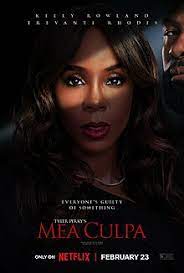
MEA CULPA
US, 2024, 120 minutes, Colour.
Kelly Rowland, Trevante Rhodes, Nick Sagar, Sean Sagar, RonReaco Lee Shannon Thornton, Kerry O'Malley, Ariana Barron, Angela Robinson, Maria Gabriela Gonzalez.
Directed by Tyler Perry.
While the title is the name of the central character, those familiar with liturgy or just the popular usage of the phrase, Mea Culpa, means through my fault and is part of the prayer of confession and the asking for forgiveness.
Tyler Perry is a significant presence in American cinema, especially African-American cinema and African-American urban life. He has studios in Atlanta Georgia, has produced many features, also written and directed many of them. And he is a well-known philanthropist.
This film needs to be appreciated for its impact On the African-American audience rather than how it might play to a white American audience.
Kelly Rowland, best known for music and music videos, plays a top lawyer, but in dispute with her drugtaking, out of job husband. His brother is DA with hopes for becoming mayor of the city. His wife is Mea’s best friend.
Complications arise when a well-known artist is accused of murdering his girlfriend, public opinion against him, paparazzi pursuit, demonstrations against the art Gallery where is paintings are displayed. He approaches Mea to represent him in court, building up a conflict of interest because the DA wants to winning the case against him. An appeal to a judge says that the trial can go ahead.
If any audience has seen and remembers Jeff Bridges and Glenn Close in the 1985 Jagged Image, they will appreciate many of the similarities, the man accused of murder, his profession of innocence, the objective lawyer, succumbing to the charms of her client, compromised – and the final solution. However, the final solution in this film is not the same despite appearances to the contrary.
The film focuses on the behaviour of Mea, her anger with her husband, his subservience to his mother with terminal cancer, her heartless domination of her children and antipathy towards Mea. The most pleasant character in the film is Mikey, RonReaco Lee Shannon, Mea’s private investigator some of his information leads to Mea’s anger, and her liaison with the artist, based on a misunderstanding.
However, there are some twists tours the end, the alleged victim been found alive, and a sudden scenario of conspiracy of the family against Mea.
Some serious themes but designed as popular entertainment.
- The title, Latin, Catholic prayer, confession of guilt – “through my fault”?
- The Chicago settings, law, business, art, affluent? Musical score?
- The work of Tyler Perry, producing, writing and directing, performing? His studios, output, for the African-American audience? Wider audiences?
- The plot and the link with the thriller, Jagged Edge? Audiences remembering the plot, the central character innocence or guilt? The lawyer, the accused seductive? Audience suspicions – and the later discovery of the victim alive, the change of plot from Jagged Edge?
- The introduction to Mea and Kal, counselling, disputes, the background of his drugs and loss of job, concealing it from his mother, the control of his mother, leaving the meeting? Mea, success is a lawyer, supporting her husband, tensions? The party for the mother, the mother’s aggressive behaviour, terminal cancer, treatment? Kal and his mother? His brother, Ray, DA and ambitions for Mayor, his wife and family, Charli the se and Mea being best friends? The tensions of the meal, the mother’s insults, dislike of Mea?
- The murder case, the artist, the scenario, the disappearance of his girlfriend, traces of skull in his painting, the protests outside the gallery, the owner and her past fostering of the artist, refusing to take down his paintings?
- The artist, Zyair, coming to see Mea, asking her to take on his case, chased by the paparazzi, his initial charm, frankness? Mea and her response, looking at the case, the damning evidence, paintings, the phone, the video accusing his claiming to speak the truth?
- The issue for Mea, conflict-of-interest with her brother-in-law, his ambitions, the decision to go before the judge, his warning, accepting their positions?
- Mea and Mickey, investigator, his following her husband, his going to rehab? Mickey and his personal style, devotion to Mea? His listening to Zaire, saying that he gave all the indications are telling the truth, but also indicating that he did not believe him? Mickey and his travels, Mexico, trying to track down the missing woman? The later information about her husband at the hotel, dire repercussions for her judgement and behaviour, and the revelation that it was a family gathering?
- Interactions between Mea and Zyair, at the office, at his loft, her businesslike approach, the paintings, his explanations, her wanting boundaries, his powerful insistence against the boundaries, his approach, blindfolding her, the painting, the blue waves? Her continued questioning? The clashes, his apology, her wanting to withdraw, his acceptance of this?
- Zyair and his seductive manner, audience reaction to him, reaction to Mea and her behaviour, the news about her husband in the hotel, the seduction, the painting, on the ceiling?
- Mea and her visit to the gallery owner, her story, her behaviour, her recounting the seduction and the parallel with the painting and the picture on the ceiling? Mea going back, the range of paintings on the ceiling, including Charlise?
- Mea and her withdrawal, going to the Dominican Republic, seeing the victim, chasing her, the police, the DA saying he would send his investigator?
- The return, with the family, the revelations of the conspiracy, the mother not sick, Charlise and her husband’s revenge, fabricating the plan? Revenge on Charlise? On her? The fight, the violence, running, her husband, allegedly dialling 911, hearing the truth, crashing the car?
- The irony that Zyair was telling the truth, his confidence in seductive manner, discussions about sexual behaviour? Mea, seduced, walking away at the end?
Baghead
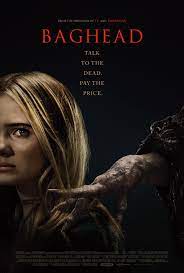
BAGHEAD
Germany/UK, 2023, 93 minute, Colour.
Freya Allen, Jeremy Irvine, Ruby Barker, Peter Mullan, Anne Muller, Svenja Jung, Ned Dennehy, Saffron Burrows.
Directed by Alberto Corredor.
Baghead is not a title that would draw in a large audience. Except, perhaps, for horror fans. One of the difficulties with horror films these days and horror film audiences is that there is a huge demand and expectation for blood and gore, increasingly, especially for younger audiences. But, this kind of wallowing is not appealing for an adult audience brought up on more traditional horror films. Which means then that the response to Baghead is more favourable from older audiences, younger audiences complaining that it is too slow, too tame…
This is British production with an international cast filmed at studios in Berlin. It is based on a 2017 short film with the same title by the writer, Lorcan Reilly and the same actor, Alberto Corredor. There has been a screenplay collaboration with Bryce McGuire, who made Night Swim at the same time (also bypassed as to tame)..
The audience is introduced to a rundown hotel in Berlin, deserted, crumbling, but with a sinister basement and a jagged hole in the wall. The host is Owen Lark, played by veteran Peter Mullan, 20 years caretaking, and a sinister creature beyond the jagged hole in the wall, a female creature, bag over her head, who emerges stumblingly on command. However, Owen has had too much, confronts Baghead, sets her and the building a light.
Then a transition to his daughter, Iris (Freya Allen) alienated from her father, but with her friend, Katie (Ruby Barker), suddenly discovering that she owns the building, a lawyer, a touch cadaverous, wants her to sell the building but she decides to sign the parchment deed of ownership.
When they go into the building, we are not surprised that there are sinister feelings, especially when they are shocked by a visitor, Neil (Jeremy Irvine) who is willing to pay them money to have an audience with Baghead, knowing that the creature will come out, shape-shift. He wants to say farewell to his dead wife but the person who emerges is his unloving mother. There is eerie atmosphere in the way that the shape shifts, skeletal hands to normal hands, the removing of the bag and the revelation…
As with this kind of tale, everything is not what it seems, Neil has ambiguous motivations, Iris wants to stay in the building, even to investigate the mysterious creature who is obedient to her command. Katie is much less enthusiastic.
So, a buildup to Baghead’s various appearances, confrontations, Iris having to come to terms with her father, the truth about the creature and the fire, conflict with Neil – and one of those endings which we might have expected but were not thinking that it would happen!
An adult horror film in the more traditional manner.
- The title, tone, theme, characters?
- The German setting, filmed in Germany? International cast?
- The setting, the streets, vistas of the city, the old pub, the basement? Atmosphere? The musical score?
- More traditional horror? Adult plot and themes? The contrast with the popularity of blood and gore?
- The opening, Owen, his age, in the building, 20 years, Baghead, the bag and disguise, shape shifting? His video, setting the fire, his burning to death? The later reprisal of the scene, his failure to burn down the building? His life, alienation from his daughter? Thinking he had burnt the title deed? Iris inheriting it, her distance from her father, growing up, institutions, friendship with Katie? The final confrontation with her father, his explanations, the repetition of the burning?
- Iris, age, ambitions, friendship with Katie, the solicitor, the explanation of the bequest, the building, he suggesting it be sold, run down? Her decision to sign? Going to the building, the initial impressions? Deciding to stay?
- In the building, the dark, Neil’s presence, suspicions, his explanations? The ritual, the chairs, the basement atmosphere, the hole in the wall, the noise, the emergence of Baghead, the threats, Neil and his wanting to talk to his late wife, offering money, Iris finding she could command Baghead?
- The shape shifting, Neil and the appearance of his mother, her saying she never loved him, the appearance of his wife, his desire to say goodbye, the reality of interrogating her, her wanting to leave him, the medication, the car crash, her death? Her saying she wanted to leave him?
- The two-minute limit, going over, the consequences?
- Iris, her visit to Neil, his explanations? Money no limit?
- Katie, scepticism, participating, fears, seeking out the solicitor, the photos and the names, the truth about the owners, the list on the document? Her phoning Iris, coming back, the experience with Baghead, her death?
- Neil, his return, bargaining with Iris? His wife reappearing, his mother reappearing, the commotion, Neil and his different desperation, Iris and her refusal, the chase, on the roof, Iris falling to her death? Neil and his motivation?
- The return downstairs, Baghead, Neil, the appearance of Iris? Her being in control, the power?
- Horror film for an adult audience?
Voleuses' Wingwomen
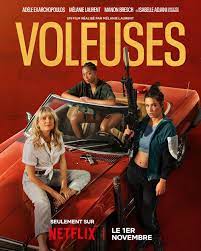
VOLEUSES/ WINGWOMEN
France, 2023, 116 minutes, Colour.
Adele Exarchopoulos, Melanie Laurent, Manon Bresch, Isabelle Adjani.
Directed by Melanie Laurent.
As the title indicates, this is a strong women’s film. Leading characters – but as the French title suggests, the criminal aspect of their lives and careers?
The film has been cowritten and directed by French and international star, Melanie Laurent (who made such an impact in Quentin Tarantino’s Inglourious Basterds who has gone on to star and direct at home and abroad).
She is at the centre of the film, with Adele Exarchopoulos, two criminals, one a thief, the other a sniper, but rescued from the streets by an elegant but sinister woman who is known as Godmother. She is played by celebrated French star, Isabelle Adjani – and seen initially at a cinema watching the film starring Danielle Darrieux and Jean Gabby and, linking this film to the tradition of French classics.
On the one hand, this is a smiling comedy rather than laugh out loud. On the other hand, it is a caper and heist movie, scenes of action, chases in the streets, drones in pursuit, shootouts. And, there is a range of international settings and beautiful locations.
There is the theme of the arch criminal and the hold over the subordinates, talking about letting them go after one last heist, but still threatening them. And, the characters who are getting tired of all the action, would like to retire quietly but are required to do one last job.
A variation on popular buddy and comic action themes, French style, women’s style.
- Title and tone? Graphic novel? Characters and action? The female perspective, characters, action, relationships, writing and direction?
- A variation on the buddy comedy, characters and relationships, action together, ordinary, crises? The musical score?
- The background of heist and capers, Carole and Alex, the opening, Alex and the rollerskating, the bruises, coming home, comfortable with Carole? The relationship? But their crime career? Killers? Their jobs, emotions? The initial action, the pursuit, the drones, their discussions about groceries and ordinary things, of the cliff?
- The theft sequences, action, suspense, chases through the streets, the drones, shootouts?
- The character of Godmother, Isabelle Adjani and her status in French cinema? Seen watching the film with Danielle Darrieux and Jean Gabin? The link to French classics? Her manner, age, control, the past and her rescuing the two, her hold over them, at her command? Her house, manner and style?
- Carole and Alex, skills as thieves, sniper? The careers? Wanting to get out? Godmother and her hold over them, the threats?
- The last job, the getting of the city plans, travel to cities, the arms dealer and weapons, going to Corsica, the target for stealing, the painting – and Godmother condemning it as kitsch?
- Sam, Formula One, driver, in need of a job, the two recruiting her, the montage and training?
- The finale, the action? Confrontation of Godmother? And the hopes for being able to live a life?
Trouble with Jessica, The
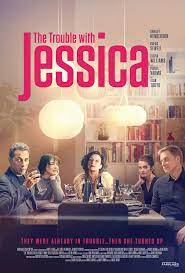
THE TROUBLE WITH JESSICA
UK, 2023, 89 minutes, Colour.
Shirley Henderson, Rufus Sewell, Olivia Williams, Alan Tudyk, Indira Varma, Sylvester Groth, Anne Reid.
Directed by Matt Winn.
There has always been trouble with Jessica. She is a novelist, sometimes reclusive, manipulative, tantalising in her relationships, and has just published a novel with references to her friends. She has turned up at a dinner at Sarah and Tom’s house, not entirely welcome. Sarah and Tom are also hosting a couple who have been long-time friends, Richard and Beth.
At first, this seems to be a variation on the Who’s Afraid of Virginia Woolf kind of gathering, some surface pleasantries, then difficulties emerging, criticism, insults, tantrums. But, after 15 minutes, looking for Jessica, they find she has hanged herself in the garden.
While the angry interchanges of the Virginia Woolf kind continue throughout the film, The Trouble with Jessica then becomes a variation on the theme: how do you conceal, then get rid of the body. This idea was popular in some of the small budget comedy thrillers of the 1930s. However, it became a significant theme when Alfred Hitchcock made The Trouble with Harry, 1955. In fact, Agatha Christie use the theme in The Spider’s Web. And, at the end of the 1980s, there was the American comedy, Weekend at Bernie’s. What to do with the body? How to conceal it?
The two couples are middle-aged, have known each other since they were young. After the shock of Jessica’s suicide, Sarah, who had had an altercation with her, takes charge, wanting to conceal the death, with a plan for the body to be transferred to Jessica’s house and set up as a suicide there. Tom more or less goes along with this plan. One of the reasons for the plan is that they are in financial difficulties, need to sell the house, have an eager client who wants to buy and they don’t want a body to be in the house when they come to inspect.
Richard is a practising lawyer, defence lawyer, quoting legal practice but somehow rather persuaded to join in the plan by Sarah threatening to reveal some dubious actions in the past. Beth, on the other hand, want to immediately go to the police, dials 911, the police turning up, pleasant exchanges, one of them discovering the desert, one of his favourites! And, a neighbour comes to the door eager to meet the writer and to get her to autograph a book.
With a lot of interchanges and recriminations, exposures of each of the characters, Richard having had an affair with Jessica and Beth’s wanting a divorce, Sarah being dominating, Tom acquiescing. The prospective buyer turns up to look at the house, the concealing the body under the stairs, the visitor wanting to look inside the cupboard, their getting the body upstairs, his leaving.
The atmosphere license, Sarah standing guard, they get the body into the car, drive to her flat, a police car pulling up beside them at a red light, a couple in the corridor, but they get the body into the room and the set up.
On the return, the prospective buyer, an affluent German businessman, returns, elicits the secret from them, wants to settle the sale immediately and, with some moments of hesitation, there is agreement. Sarah and Tom is saved but Sarah suddenly changes her attitude, wants to call the police. This is all to do with a reference in Jessica’s book and Tom, while the audience obscene flashbacks, admits an occasion with Jessica before they met. Richard then confesses that he has had the affair but, by this time, Beth has somewhat calm down after participating in the setting up of the suicide.
The film has a top cast, Shirley Henderson top lining the film as Sarah, with American Alan Dudek is her husband. Rufus saw and Olivia Williams are the other couple. And the cameo scene of the neighbour wanting the autograph – and it was an angry when the car with the body is about to leave and she is upset that the author will not come out of the car – played by Anne Reid.
There is one barrier that many commentators have noted – the proliferation of swearing throughout the film, judge it excessive, and many surprised at this group of actors, including Anne Reid, prepared to mouth such constant coarse language.
Kiki
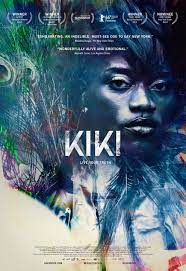
KIKI
US, 2016, 94 minutes, Colour.
Twiggy Pucci Garcon.
Directed by Sara Jordeno.
Drawing on the Wikipedia article on Kiki.
Kiki is an American-Swedish co-produced documentary film, released in 2016. It takes place in New York City, and focuses on the "drag and voguing scene (deriving from Madonna and her song Vogue ("Voguing"—an exaggerated dance style started in the underground ballroom scene in Harlem) surveying the lives of LGBT youth of color at a time when Black Lives Matter and trans rights are making front-page headlines".The film was directed by Sara Jordenö and considered an unofficial sequel to the influential 1990 film Paris Is Burning,]the film profiles several young LGBT people of colour participating in contemporary LGBT African American ball culture.
Jordenö was invited to create the film by Twiggy Pucci Garçon, a leader in the kiki community in New York. She cowrote the film with them. Jordenö was able to film her subjects over the course of several years. She was able to follow two of the film's subjects Gia Marie Love and Izana Vidal as they went through their own transitions as trans women.
The drag and ball scene are venues in which many queer and transgender people of color can find community as well as express themselves. Kiki is more intertwined with activism and education as it focuses more on people between the ages of 13 and 24 instead of older queer and transgender individuals.
“While there are similarities in many of their stories, each journey is different. Many of the young adults profiled have been kicked out of the house for being trans, queer, or just gender-nonconforming. They have gravitated towards one another, and immersed themselves in a culture that is nonjudgmental, open, and caring. They take care of each other. They crash on each other's couches. They have each other's collective backs.” Sheila O’Malley, Rogerebert reviews.)
The issues that transgender youth of color face include the struggle that many transgender people of color faced was trying to start and continue their hormone replacement therapy as well as sex work.
Kiki also depicts what it is like for LGBT youth of color to experience discrimination. When it comes to the LGBT neighborhoods, there is some mention of police officers that patrol the neighborhood engaging in homophobia. As a result of the discrimination that they face from society, many have to navigate taking part in sex work as a means to support themselves.
This is also where the ballroom and drag scenes come into play as many of these youths use these avenues to claim space that otherwise would be denied to them. Kiki is a film that is glamorous, but also educates its audience and depicts the very serious realities that many LGBT youth face.
HIV/AIDS activism is so important to them and the kiki scene. There is a strong focus on community education within the film to help show the youth that this tight knit community cares for them and wants to keep them safe. The film discusses how education and activism can be difficult considering all of the negative stigma around being LGBT identified, black, young, and HIV positive. Gia Marie Love, who identifies as trans, also explains how there is a lack of focus on HIV and STI prevention among the trans community.
Nut Farm, The
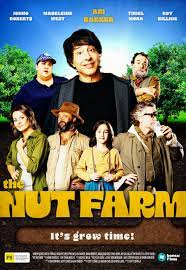
THE NUT FARM
Australia, 2023, 91 minutes, Colour.
Arj Barker, Jonno Roberts, Madeleine West, Tiriel Mora, Roy Billing, Gyton Grantley, Steph Tisdell, Annie Byron, Dave Eastgate, JJ Pantano, Danny Faifai, Tracy Lee Maxwell, Brad McMurray.
Directed by Scott Corfield.
Intentionally, the title seems to be indicating some kind of mental establishment. While there are some quite strange goings-on, an absurd character or two, or three, the title actually refers to a property in the remote small Australian town of Cobweb, a macadamia farm.
This is a small Australian film, often tongue in cheek, happy to send up American innocents abroad, a jibe or three at some New Zealanders, and a range of local characters who populate Australian television series, especially the comedies
Our central character is an American, Brendan Brandon, played by comedian Arj Barker, who seems to be a cryptocurrency expert in San Francisco, giving self-satisfied speeches to admiring crowds, but then falling on hard times. We have already seen an old man seemingly prospecting, finding a manhole and going down – and disappearing. He is Mitch and his friend, Harry, phones Brendan to say he has inherited Mitch’s macadamia farm. What on earth does Brendan know about farms or macadamias? Answer, of course, nothing.
Brendan flies to Australia, picked up from the plane by Esme who runs the local pub (incorporating all shops, the diner, the bar…), Looking for all the world like a Dame Edna caricature. Harry is played by Tiriel Mora in his very sad sack style. There are various characters in the town, including old Dazza who spends time at the bar, Sgt Blake, who has all kinds of jobs in Cobweb from policing to delivering the mail (and enjoyable performance from Steph Tisdale), the enterprising Farmer Dee who tells of an avocado farmer who has disappeared. He helps Brendan with the macadamia trees and cultivation – and then disappears.
What is Brendan to make of all of this? Especially when Harry tells him that he has to produce 20,000 tons of macadamia nuts to finally inherit!
Meanwhile, we look below the surface, a fracking enterprise which disturbs the locals and has disturbed Mitch. In the tunnels there is a mad scientist, Zoran (New Zealand actor Jonno Roberts), with a very efficient, office -like assistant and two miners digging in the trenches). It is finally revealed what Zoran is up to – an attempt to assist New Zealand economy!
Since this is also a light comedy, there had better be a bit of romance. There is the enterprising farmer, Kim, who is attracted to Brendan (some of the audience perhaps not entirely sure why), and her rather precocious young son.
When Brendan fails by a couple of kilos to meet his quota, he goes prospecting and uncovers Zoran’s mad enterprise.
And, happy ending, Brendan seeing sense, of course, and staying in Australia with Kim and her son and the macadamia nuts – and all the new friends in Cobweb!
- The title? Literal macadamia nuts? The overtones of nutty – nutty comedy?
- The opening in San Francisco, the world of crypto currency, speeches and customers? The contrast with Australia, the town of Cobweb, the farm, the landscapes, the tunnel? The Australian feel? The sending up of Americans? The musical score?
- Mitch, old man, seeming to be prospecting, the search, his disappearance down the hall? Bequeathing his farm who Brendan? The others disappearing, the avocado farmer, later Farmer D?
- The audience seeing the sore arm, his assistant, the miners, his manic behaviour, going to the shop, Has a as a spy, theatrical? His aim, gas for New Zealand? The issue of fracking?
- Brendan, age, character, success, his well collapsing, the phone call from Australia, his arrival, landing, the small town, airport, is made turning up, looking like Dame Edna Everage?
- Harry, friendship with Mitch, the phone call to Brendan, meeting him, the farm, the property, the house? The claws of having to farm 20,000 tons of macadamia nuts?
- Sgt Blake, her variety of jobs, changing personality with each job? The irony of the bar, the various sections and the various shops, stores, eating places?
- Kim, hard work, her son, precocious, the attraction to Brendan, the possibility of a relationship?
- Brendan, the house, getting used to Australia, Farmer D and the information about the macadamia nuts, tending them, his work?
- Just falling short of the quota? The legal consequences?
- Brendan, exploring, finding the trapdoor, going down, discovering the captives?
- The buildup to the confrontation, the audience having seen the miners and their interactions with the locals, Zorro and his assistant, her efficiency? The technical know-how, the fracking? Leading to the explosion? Brendan, deciding to stay, the relationship with Kim, her son?
- A small piece of Australian owner?
Dune, Part 2
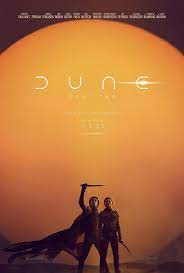
DUNE, PART 2
US, 2024, 166 minutes, Colour.
Timothee Chalamet, Zendaya, Rebecca Ferguson, Javier Bardem, Josh Brolin, Austin Butler, Florence Pugh, Dave Bautista, Christopher Walken, Lea Seydoux, Stellan Skarsgaard, Charlotte Rampling, Roger Yuan.
Directed by Denis Villeneuve.
Denis Villeneuve’s 2021 version of Dune made quite an impact. The Dune novels by Frank Herbert had been popular for decades. David Lynch had made a version in 1984 which was not favourably received (except by this reviewer!). So, in a sense, Villeneuve’s version was a vindication of the power of the novel, its characters, its imagination, its mythical vision of the future.
Now, here is Dune Part 2 – and, in its immediate release, it seems to have pleased almost everyone, quite a number of bloggers relying on the word “masterpiece”. Whether that be the case are not, the film is certainly visually impressive as was the original. And, this review is based on an IMAX screening, which is thoroughly recommended. The landscapes, the endless mounds of dunes, the craggy mountains, the canyons provide a vastly impressive setting. And, the musical score, the brass instruments and their resounding make the cinema seats reverberate.
And, with this kind of tale-telling, kingdoms, battles, futuristic weapons and armaments, vast buildings and interiors, including an enormous gladiator arena filmed in black and white, hundreds of thousands of spectators, there are what we might call state-of-the-art… Effects.
For those familiar with the novels and the films, there is no need to wonder about the House of Atreides, the fate of the ruler, his young son, Paul, his mother, Jessica, the conflict with the Emperor, the hostility towards the Harkonnens. Those not so familiar may have a lot of moments, especially in the battle sequences, as to who is who and why it is all happening at this moment.
As before, Timothee Chalamet is Paul, Rebecca Ferguson his mother, Zendaya is Chani.
In the first part of this this film, we focus on Paul and his mother, the bond with Chani from the previous episode, the hiding from enemies in the desert (who have enormous sky vehicles and have the power of levitation up the sides of mountains), then some combat with hostile locals. However, the local leader, Stilgar, Javier Bardem, welcomes the foreigners, and, with echoes of biblical/Islamic traditions, a reliance on prophecies and fulfilment, a hope for a Messiah. Stilgar puts Paul to the test.
Then we go back to the spice industry, the villain, Beast Rabban, Dave Bautista, his ruthlessness, but also his defeat, his return to his master, Baron Harkonnen, Stellan Skarsgaard, who is grooming his nephew, Austin Butler, whom he describes as psychotic, who combats three remnants of the House of Atreides.
There is further drama concerning Paul’s mother, her later discovery of who her father was and what that means in terms of Atreides versus Harkonnens, and her becoming the new Reverend Mother.
New characters in this film include Christopher Walken as the Emperor and Florence Pugh as his Princess daughter, who has been trained by the sinister Reverend Mother, Charlotte Rampling.
Which means that it all has to come to a head, the power of the Emperor, his plans, Paul as the new saviour, Battle confrontation mano a mano between Paul and the psychotic nephew.
While there is some resolution, the way is now open for a climax in Dune Part 3
- The long popularity of Frank Herbert books? 1984 version? The impact of Part 1?
- The continuation of the story, life on the planet, Arrakis, the house of Atreides and its destruction, the Harkonnens, the Emperor and his family, the setting in the 10,000s?
- The landscapes, the dunes in the desert, the mountains, canyons, the cities, the interiors, the vast buildings, the gladiatorial arena? The colour photography? Black-and-white photography for the Harkonnen world?
- Action sequences, the range of special effects, in the desert, the worms and movement, the winds, the aerial machines, the Army sequences and battles, the hand to hand final combat?
- The musical score, the instruments, the booming and reverberating sounds?
- The situation, the destruction of the House of Atreides, Paul surviving with his mother, the previous bond with Chani, hiding and the attacks in the desert, aerial surveillance, the ability of the soldiers to ascend and climb the mountain sides?
- Paul and his mother and Chani, brought to her people, the issue of the combat, the defeat of their warrior, the response of the crowds, the men, the sceptical women? The funeral?
- Stilgar, his status in the community, the Biblical/Islamic traditions of written words and prophecy, the hope of a saviour? The men and their beliefs, their prayer? The women critical including Chani? Stilgar and his personality, leadership, influence on the others, belief in Paul? Fulfilment of prophecy? The range of tests, the crossing of the dunes, Chani and her advice and help, the big test, going out into the dunes, the soundings, the worms emerging, giant, Paul and his abilities, the hooks, and riding the worms? Acclaim?
- The solemn place of the Reverend Mothers, Jessica, her bond with her son, chosen to be a Reverend Mother, the rituals, the old Mother and succession, the transfer of knowledge, the abstract colour visuals for these sequences? Her tattooed face? Her role with the women, knowledge and advice? Her wanting to go south, to return home, with Paul? His refusal? Seeing her off with the entourage?
- The episode with Beast Rabban, the initial caption about the power and the power with the spice? The spice industry, cause of conflict? The farming of the spice, collecting it, financial issues? The Beast and his autocratic behaviour, slitting the throats of his advisers? Falling foul of the Emperor, the aerial sequences, his defeat, having to kiss the feet of Fayd-Rautha?
- The tradition of the Harkonnens, the Baron, in the bath, his size, bloated? His relationship with the Emperor? Helping the Emperor to defeat the House of Atreides? His plans for his nephew? The description of the nephew as psychotic? Everybody with shaved heads? Preparations for the gladiatorial combat, the black-and-white photography, the visuals of the arena, the special effects for hundreds of thousands of spectators, the three final warriors from the House of Atriedes, the confrontation with Fayd-Rautha, the fights, his arrogance, the blood, the knives, the final foe giving him a fight? Arrogant Victor?
- The return of Gurney, the story in the past, smuggling? The friendship with Paul, their bonding? Chani and her suspicions? Gurney and his participation in the insurrection, present at the end?
- The scenes with the Emperor, his rule, under threat, his assertion? The scenes with his daughter, his hopes for her? The Reverend Mother, her manner, influence in the past, training the daughter, ambitious, controlling, her strategies, her ruthlessness?
- The buildup to the confrontation with the forces of the Emperor, Paul, the Fundamentalists from the south, the attack, the air vehicles and their destruction, on the ground, the firepower, the skills of the fighters and their disguise, rising from the sands? The visuals of the vast confrontations?
- The victory, the confrontation with the Emperor, Paul and his assertions, the killing of the Baron, revenge? The Emperor, defiant? Fayd-Rautha as his champion? Paul and his conditions, speaking of marrying the Emperor’s daughter, peace, Chani and her reaction?
- The Mano a Mano fight, strategies, techniques? Paul being wounded? Turning the tables on his opponent, his death? The Emperor, having to kneel before Paul?
- Stilgar, everybody rejoicing, Paul as the saviour? His mother and her response? The defeat of the Reverend Mother and the Emperor’s entourage?
- The ending, the openness to the reassertion of Paul Atreides and his leadership?
20 Days in Mariupol
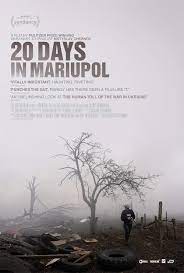
20 DAYS IN MARIUPOL
Ukraine, 2023, 95 minutes, Colour.
Directed by Mstyslav Chernov
A significant documentary for its time. And a significant documentary in future years for any assessment of Russia’s invasion of Ukraine in 2022 and its subsequent history.
This documentary has won several awards and is a nominee for the Academy Award for Best Documentary.
Mstyslav Chernov is a celebrated Ukrainian journalist, photojournalist, committed to peace causes. (It is worth checking his Wikipedia entry especially to see the number of awards, and their wide range, that he has received while still in his 30s, including the Pulitzer Prize.)
He was in the southern coast city of Mariupol on February 24th 2022 when Vladimir Putin made a press announcement (seen in this documentary) announcing a special operations in Ukraine, attributing aggression to Ukraine, Nazi attitudes. However, this was a follow-up to the invasion of Crimea in 2014 and its annexation and Russia’s territorial ambitions – with memories of interactions between Russia and Ukraine in previous centuries as well as Stalin’s treatment of Ukraine in the 1930s famine.
The director was reporting for Frontline, American PBS channel. This documentary, covering the almost 3 weeks that the director was in the city before leaving to take his footage to be available for the wider world, catching up with the Red Cross convoy, was edited into this feature documentary and released, screening at the Sundance Festival, a month before the first anniversary of the Russian invasion.
In Australia, the film, Oscar-nominated, became available just after the second anniversary of the invasion – and the uncertainties about the future of the conflict. While the language of the film is all about the present, those three weeks in 2022, audiences in 2023 watched it in the retrospect of one year of the war. With the second anniversary of the war, 2024, the war had lasted 730 days. So much warfare, so much Ukrainian spirited resistance, the leadership of President Zeleneky, assistance from Europe and NATO, from other allies including Australia, the ups and downs of financial and arms support from the United States.
So, audiences, including those influenced by the Oscar nomination, are watching the events two years later. Which, of course, in no way diminishes the horror, the violence, the atrocities, the sufferings and death, family bereavements, the pressures on doctors and nurses, bombardments, lack of resources, hunger… And the thousands who left the city.
And, for those watching the film in 2024, there is also the experience of making comparisons with the war in Gaza, the experience of the Palestinians from the Israeli invasion and bombardments following the Hamas brutal attack, the parallels of doctors and nurses, lack of means, the many deaths, injuries and the sadness of the bereaved, as Well Is the bewilderment of the survivors.
This is painful watching even for those comfortably observing from afar. This is a kind of necessary documentation that needs to be kept, seen, lest we forget. The director and his associates spent a lot of time in the hospitals, documenting the work of the doctors and nurses, the difficulties, and filming out in the streets, significantly the filming of pregnant women, the babies, the children, the deaths and the grief-stricken parents. The director trying to track down the pregnant woman in the bombed streets and finding she had died. The father mourning the death of his son, 16-year-old, playing soccer when the bombs fell.
The accusations against the Russians with the bombing and the arrival of the tanks and bombardments are strong, condemning the seemingly targeted attack on civilians – denied by the Russians, spokespersons on Russian television, officials at international meetings, as well as that unfortunate heritage from Donald Trump, “fake news”, the Russians insisting that so many of the scenes in those 20 days at Mariupoll were movie sets with actors performing.
That was in the first three weeks of the war. In the ensuing months and years, there have still been denials, but the evidence is clear, the importance of photojournalists, filmmakers, photographing and recording on the spot so that evidence is not lost but finds its place in asking for empathy from the world, but also providing material for judgement and condemnation.
Autre Monde, Un/ Another World
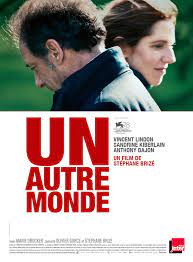
UN AUTRE MONDE/ ANOTHER WORLD
France, 2021, 96 minutes, Colour.
Vincent Lindon, Sandrine Kiberlain, Anthony Bajon, Marie Drucker, Jerry Hickey.
Directed by Stephane Brize.
If one were to recommend a film about capitalism, about industrialisation, downsizing, board meetings, and the effect of profit-focused management and its repercussions on individuals and families, Another World would be a good contender.
It is a comparatively brief film, very strong on dialogue, on words, on verbal interactions. It opens with the pending across photos of a lifetime of a marriage, then proceeds to acrimonious conversations for a divorce, a focus on the busy husband, another very strong performance from veteran Vincent Lindon has Philippe, and his wife of decades, Sandra Kiberlaiin, discussions about money, her saying that money was not important.
Then the film moves to board meetings, Philippe having given seven years of his life to head up a department, having strong views, not afraid to express his opinions, interacting with his colleagues. There are further complicated board meetings with higher authorities, with an American authority, a very telling sequence where the American praises Philippe and his submission and then, initially apologetically, condemns his proposal.
Philippe is shown at the meetings, vigorous, but also studying documentation, quiet, continually exercising on a treadmill, some meetings with his wife, a subplot concerning their son who has had an outburst, attacking a Professor, and is in treatment.
Ultimately, Philippe has to decide between ambition and success and integrity.
- The title, another world from ordinary people’s lives? Yet ordinary people being drawn into its ambit?
- The French city, homes, business offices, institutions? The musical score?
- A film of dialogue, expertly written conversations, in divorce proceedings, in boardrooms, at home, at the institution for the son, quiet private rooms?
- The opening and the tone, introduction to Philippe and Anne, slow tracking over the photos of the family over the years, the divorce proceedings, each side of the desk, financial issues, Philippe dominating, the advice of the lawyers, Anne and her quiet, submissiveness, her experience of the previous seven years and Philippe’s job? Audience sympathies for each?
- The transition to the board room, the many board room sequences, the intense conversations, Philippe, ideas, dominant, challenging, Olivier and his opinions about downsizing, the various members of the board, the range of opinions? The further board room discussions, the heads of departments and plants, the chiefs, the national board, the raising of issues, to and fro, dealing, debating?
- A film about capitalism, intensity, profit and Wall Street, unions and members, the issues, financial versus personal? Issues of profit? Downsizing, testing capabilities and decisions about who should be let go? The pressure on Philippe? Seeing him by himself, the constant treadmill exercise, quietly at home, quietly studying the documents?
- The film’s portrait of executives, their ambitions, motivations, interplay? The important interview with Cooper, his initial praising of Philippe and his methods, then the complete condemnation of his proposal? Responsibility to shareholders, to Wall Street?
- The background human story, Philippe meeting An inen the car park, their talk, her breaking down, feeling foolish, turning 50, prospects? His conversation with Lucas? The episode and Lucas attacking the professor, to the institution, the treatment, the parents present, the sadness, the discussions, the episode of him working with the puppet (and the final image of puppet control and the puppet walking further? The relationship between son and parents, his treatment, his wanting the books to study, his ambitions, settling down, the possibility for his improvement?
- The buildup to decisions, the fact that Philippe was taped, the reassurance to the union representatives, that challenging him? The interview with the bosses, the proposal to get rid of Olivier, Philippe, the intensity of his reflections, the issue of integrity, his letter refusing the offer, condemning the officials?
- An opportunity for a broad audience to appreciate something of what happens in business, industry, profit, downsizing, personal integrity?
Joyland
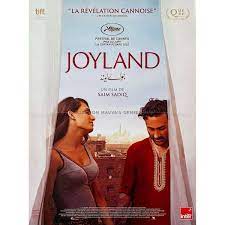
JOYLAND
Pakistan, 2022, 126 minutes, Colour.
Ali Junejo, Rasti Farouq, Alina Khan, Sawat Gilani, Salmaan Peerzada, Sohail Sameer, Ramiz Law.
Directed by Saim Sadiq.
Joyland is an unexpected film from Pakistan, screened with success and awards at Cannes, experiencing censorship problems in Pakistan itself, ultimately released there with some cuts – some surprising episodes even for the main audience, episodes which were probably cut.
There are traditions in various parts of Asia and the Pacific where a trans-person, male to female, is seen as someone sacred. There is something of this background in this film but presented in a far more earthy fashion.
Very strong framework for the film, showing a Pakistani family, the dominating patriarchal presence of the father, his expectation of his two sons, of his two daughters in law, of neighbours. One son is married with several children, his wife pregnant, their hoping for a son. The other son, the focus of the film, Haider, does not have a job, works at home around the house, his wife having a job as a beautician and adviser. Then the patriarch decrees that the son should work, that the wife should stay at home.
The focus then goes on to Haider and his friend getting him a lead to a dancing troupe, backup to a trans-woman, Biba. She has a strong personality, also dominating, sometimes at the mercy of the entrepreneur of a club, sometimes outwitting him, able to dance during a power failure with Haider encouraging her and the patrons, mainly male, shining light with their phones. Haider then becomes very attached to Biba, a sexual encounter which alienates Bibafrom him.
The other part of the plot is the complication about Haider’s wife, her pregnancy, her mental decline, her death and the consequences.
The film draws its audience in, observing the intense life of the family, sometimes sympathetic, sometimes alienated, and also dramatises the world of the trans-dancer, acceptance and non-acceptance.
- The title? Tone? The theme park and its title?
- The reputation of the film, screening in Cannes and winning awards? Banning in Pakistan? Released with cuts? International acclaim?
- The city of Lahore, the atmosphere of Pakistan, urban, neighbourhoods, homes, celebrations, the streets, Joyland and the rollercoaster, the musical score?
- A film about family, patriarchal, the presence of the Father, his dominating, controlling his sons, influence on his daughters-in-law, hopes for grandchildren, boys, presiding at meals, criticisms, especially of Haider? His neighbour and staying the night, her son and his arrival, judgement and condemnation? His 70th birthday, the cake in celebration?
- The next generation, the two boys, the older and his marriage, his wife pregnant, managing the house, cooking, the traditional role? The contrast with Haider, the relationship with Mumtaz, as not working, his duties at home, housekeeping, his father, her having the job, beautician, the preparation for the wedding, the lights going out, everybody holding the torches, her success? The pressure on Haider to have a job, the pressure on Mumtaz to stay home, her reactions? Her sister-in-law and their bonding? But the gradual effect on her, some alienation from Haider, his absences from home, the job? The outing with her sister-in-law and the rollercoaster? The test, her pregnancy, a boy, her reaction, not telling her husband, wanting to leave home, packing, her return? Her decline, her drinking the substance, her death?
- Haider’s story, age, not having a job, at home, his wife at work, the changes situation, his needing a job, his friends? The issue of the theatre, dancing? His hesitations, the encounter with Biba, attracted to her, the rehearsals, his awkwardness, improving, Biba relying on him in times of difficulty, his performance, his persuading her to dance when the lights went out, the audience holding their phones for light? The effect on him, the dancing, with his friends and discussions, homely night late? His father’s reactions?
- The issue of transition in Pakistan, worldwide? Biba, transition to female dancer, the men and their curiosity about her, her reactions? The domination, demands on the manager of the theatre, financial issues, relying on Haider? His attraction, spending time with her, her response? The sexual issue, his taking position, her reaction, ousting him? Issues of his orientation?
- Sequence of the large poster cut out, transporting it, into the house, on the roof, the neighbour seeing it in reporting, the family reaction?
- The death of Mumtaz, everybody gathering, the puzzle, the mystery of her death, pregnancy, the loss of the child? Upsetting the grandfather? Haider and his brother, the interactions, the future?
- The ending with regrets, Haider and his memories, the first encounter with Mumtaz, their bonding, the proposal, the possibilities for a happy future… But not?